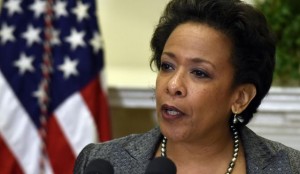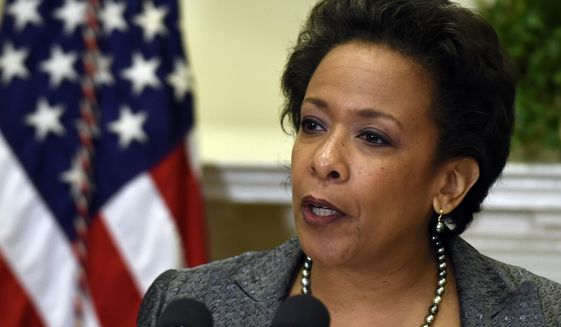Members of the Judiciary Committee need to get answers from Obama’s nominee for attorney general.
By Peter Roff • U.S.News
 This week, Iowa Republican Sen. Charles Grassley will call to order a meeting of the Senate Judiciary Committee for the purpose of considering President Barack Obama’s nomination of Loretta Lynch to be the next attorney general of the United States.
This week, Iowa Republican Sen. Charles Grassley will call to order a meeting of the Senate Judiciary Committee for the purpose of considering President Barack Obama’s nomination of Loretta Lynch to be the next attorney general of the United States.
In the main, the nomination is not controversial – though it should be. As my Frontiers of Freedom colleague George Landrith has written in The Washington Times questions, serious questions, have been raised about the conduct of prosecutors working under Lynch in the office of the U.S. Attorney for the Eastern District of New York. They should be enough to slow the nomination’s progress until she can explain how and why the rights of crime victims and their ability to apply for restitution as specified in existing federal law were ignored and what steps she has taken to correct these wrongs.
All that, however, is the tip of the iceberg. How Lynch managed the attorneys at her command is the only window available through which we can catch any glimpse of how she might manage the enormous resources available at the Department of Justice. It is something about which all should be concerned because for years, under both Democrats and Republicans, federal prosecutors have built a culture in which they are a law unto themselves, more interested in winning convictions for any reason than in the pursuit of justice that is their mandate.
Former Assistant United States Attorney Sidney Powell writes about this problem eloquently in her book “Licensed to Lie.” In it she recounts not just her own experiences representing a defendant who was part of the massive Enron case but also the wrongs done to former U.S. Sen. Ted Stevens of Alaska, whom federal prosecutors “railroaded” into a conviction that cost him his seat.
Powell alleges, with considerable evidence to back it up, that federal prosecutors routinely and deliberately misstate the facts of a case and the law governing it to judges overseeing their trials, deliberately withhold exculpatory evidence, intimidate potential defense witnesses, stack indictments to run up the potential jail time a defendant may face if convicted on all counts, stitch together pieces of individual laws to make up indictments that are without foundation, lie under oath, threaten businesses, and in general act in a way as to make those involved in the federal justice system endure a Kafkaesque experience straight out of a police state.
If confirmed, Lynch steps into a mess not of her own making but which she will have the responsibility for cleaning up – and she should be held accountable if she doesn’t.
In an interview, Powell suggests a number of questions that senators on the Judiciary Committee should consider asking Lynch at some point during the two days of hearings, currently scheduled to begin on Wednesday. Among them:
1. The Project on Government Oversight identified hundreds of instances of both reckless and intentional prosecutorial misconduct in a Freedom of Information Act request it lodged with the Department of Justice. If confirmed will you release the names of these prosecutors and what other actions do you intend to take to stop this kind of conduct within the department?
2. What action will you take in response to the technical reversal of the sanctions against two of the prosecutors in the Ted Stevens case who recently had their 45 day suspensions erased from their permanent records? Will you change departmental policy going forward?
3. How do you define the government’s obligation to turn over exculpatory information to the defense under Brady v. Maryland?
4. Do you intend to read a materiality requirement into the prosecutor’s original decision whether to provide favorable evidence to the defense?
5. What is your position on the Fairness in Disclosure of Evidence Act?
6. Have you reviewed the ethical grievances filed against Andrew Weissmann (formerly with the Enron taskforce, later general counsel to the FBI and now the nominee to head up the DOJ Fraud Section) and Kathryn Ruemmler (also of the task force and later counsel to president of the United States) for their role in “yellow-highlighting” but hiding evidence favorable to the defense while four Merrill Lynch executives went to prison on a fatally-flawed indictment that didn’t even state a criminal offense in its primary counts?
7. What is your view of the Office of the Inspector General for DOJ? Are you willing to give the [inspector general] unlimited access and more authority – given that independent surveys have routinely identified the DOJ IG as the weakest of all those in the federal government?
8. What is you view of the role of the Department of Justice’s Office of Professional Responsibility? Would you be willing to have it led by a non-political, leading expert in legal ethics from outside the department?
9. Where does the money go that the Department of Justice takes in from its criminal fines of major companies, like JP Morgan and Google?
10. Do you approve of the department bringing prosecutions that stretch the law and usurp the role of Congress – like all the invalid “honest services” prosecutions and the current case against FedEx where the government is stretching the law beyond all precedent and, in doing so, trying to make law?
These are all serious questions. Some may be arcane or narrow, but all go to the heart of the basic American principle that men and women are innocent until proven guilty and that the burden of proof rests on the government to demonstrate that guilt. Further, and something the senators on the committee need to realize, this does not include making a case so difficult, so complex and so expensive to defend against as to force those who stand accused of wrongdoing to pursue a plea agreement because the risks of not doing so outweigh the benefits of proving one’s innocence.
The bad actors inside the Department of Justice need to be reined in. If confirmed as the next attorney general, Loretta Lynch would be in a position to do so – but only if she is willing to take on the task. Members of the Senate Judiciary Committee have a chance to test her mettle on Wednesday and Thursday; they should make the most of it.
